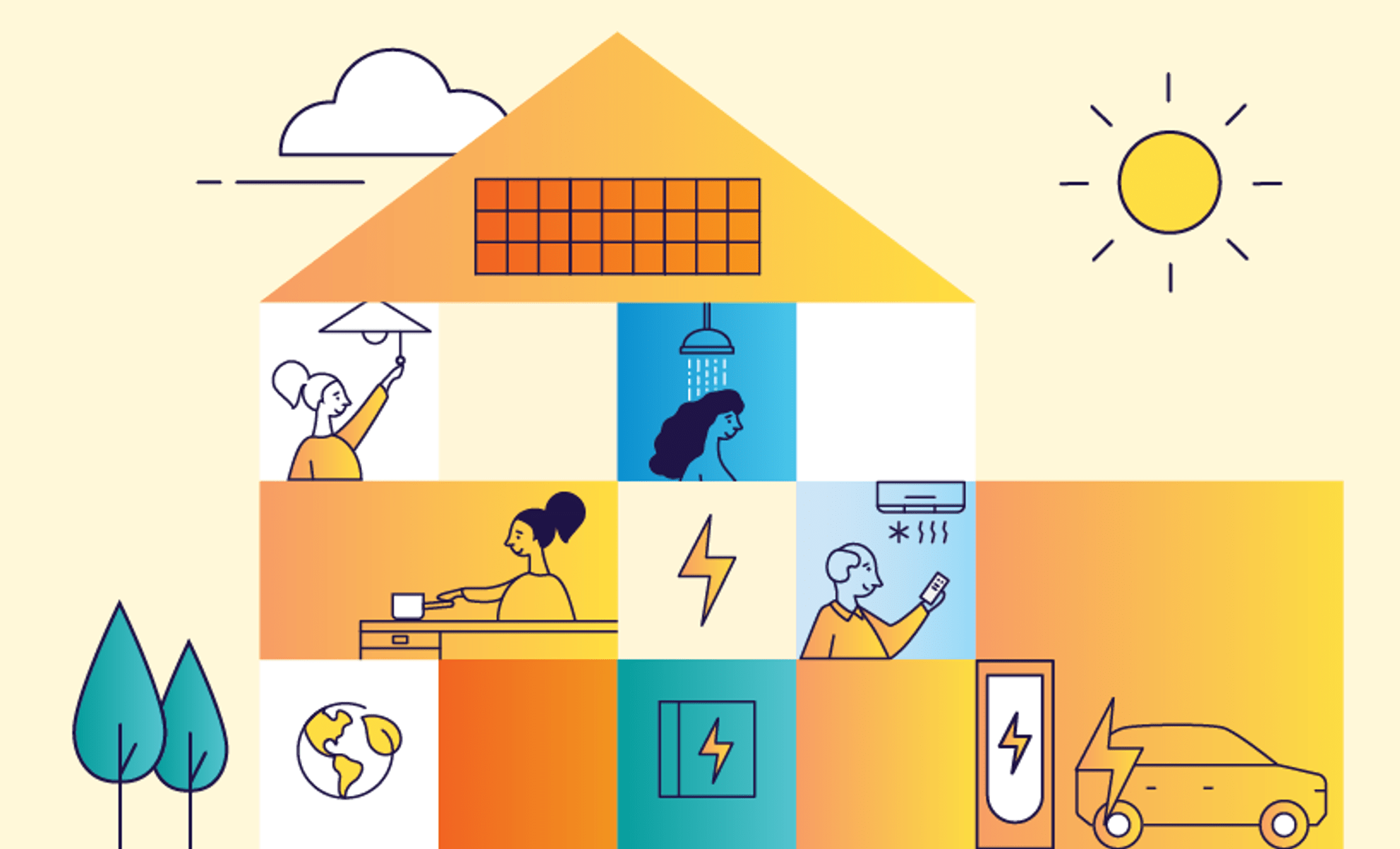1. Make a plan
Electrifying your home isn't an overnight process. It can take several months – or even years.
When deciding to switch your appliances and car to electric alternatives, do some research to know what you want to achieve, what you can afford now, and into the future.
How long it takes you to go all-electric in your home will depend on your budget and the age of existing appliances, as well as any other planned activities such as renovations or building a new home.
Carving out a plan that prioritises which appliances to replace over time, within a budget, will help you make the switch. With planning you can minimise any inconvenience and reduce costs. It will also ensure you get value for money when replacing appliances based on their condition and expected lifespan.
Small habits to reduce your energy bills
2. Prioritise your appliances
To save the most money and generate the greatest benefit for the environment, consider replacing the appliances that use the most gas, first. In most houses, this is heating – and then hot water systems and cooktops.
Typically, appliances in order of highest gas use might look like this:
- Gas heater in main living room
- Second gas heater in a smaller room
- Hot water system
- Gas cooktop
Also consider which of your appliances might be oldest and need upgrading sooner. If an appliance is more than ten years old, bring it up higher on the list. These appliances are already approaching the end of their life and a newer model could be safer.
To maximise the use of your appliances and avoid creating additional waste, replace appliances one at a time, as they approach the end of their working life.
3. Know your budget (and factor this into your timelines)
We know that by switching to electric appliances, you'll save more in the long run – due to rising gas prices.
As an example, converting an existing home with solar panels from running on gas to electric appliances, could save over $1,000 every year on energy bills when you maximise the use of solar energy.
If you haven’t switched to solar already, a Solar Victoria rebates of $1,400 for rooftop solar (PV) plus an equivalent interest-free loan can also help you reduce the upfront costs involved.
The Victorian Energy Upgrades Program also offers subsidies to replace gas heating and cooling systems based on the emission reductions available from switching to less carbon-intensive appliances. You can also access a rebate of up to $1,000 from Solar Victoria for upgrading to an energy efficiency heat pump or solar hot water system.
So, while the financial incentives for going electric have never been stronger, there are some upfront costs that you’ll have to budget for.
As at June 2023, you could expect to budget the following to purchase and install these electric appliances. Installation costs can vary, and we recommend consulting with your retailer for a full understanding of the total costs involved:
| Heating | Single room heating Split system reverse cycle air conditioner: $600-$5,500 Whole of home or multi-room heating Ducted reverse cycle air conditioner: $9,000-$14,000+ Heat pump hydronic heating: $40,000+ |
|---|---|
| Hot water | Electric heat pump: $2,500-$5,500 Electric storage: $450-$1,900 |
| Appliances | Portable induction cooktop (plug in) $60 - $400+ (no installation required) Built-in-induction cooktop: $1,000-$5,000+ Electric oven: $390-$9,500 |
| Car | Electric bike: $1,500-$4,000+ Electric vehicle: $44,990-$200,000 |
4. Set a timeline
Your available budget will help you decide a timeline for going all-electric. This might vary from a few months to several years, depending on what appliances you have and your other household needs. If you can afford the upfront out-of-pocket costs or loan repayments after rebates or incentives, you can get started right away.
Don't forget that you can channel savings from your first gas to electric upgrade into financing the next one – and so on.
Or, if you are planning renovations or a new build, it might be more cost effective in the long run to make some changes at that time.
Here's an example plan for going electric over five years:
Year one
Replace gas heater in main living room
Year three
Replace hot water
Year five
Replace cooktop (and close gas account)
5. Select your new appliances
Now comes the fun part: researching and choosing your new electric appliances! Consider how your household uses energy for heating, cooking and hot water to choose appliances that suit your lifestyle and needs.
Questions to ask:
- How big are the rooms I need to heat?
- How many people use hot water at peak times?
- How many pots/pans do I usually have on the cooktop at any one time?
- How much space do I have for outdoor and indoor components?
Ask retailers about the features and options in your budget, and what size system would suit your household. We recommend that you get multiple quotes for the same system for comparison. Look for the best value, not the cheapest quote. A system that’s too small for your household’s needs could cost you more if it means that you end up using it more heavily.
You could also talk with friends or family if they have recently upgraded appliances. Read online reviews and know what’s right for you.
The comparison website, CHOICE is an independent, product review website that provides comparisons and reviews of different household appliances, including induction cooktops and electric heaters. Become a member to access their articles or see if your local library offers free membership.
In comparing different appliances, familiarise yourself with energy rating labels. The more stars, the more efficient the appliance and the cheaper and more efficient it will be to run.
Another useful resource is community groups on social media which include people like you who have switched some or all appliances to electric. It’s a great place to learn from people who have already been through the process and can therefore provide invaluable advice based on their experiences.
Want to dive deeper into switching to electric cooktops, heating and hot water? See our guides on electric cooktops, heating and hot water. Check them out to start your electric journey today!
Updated




